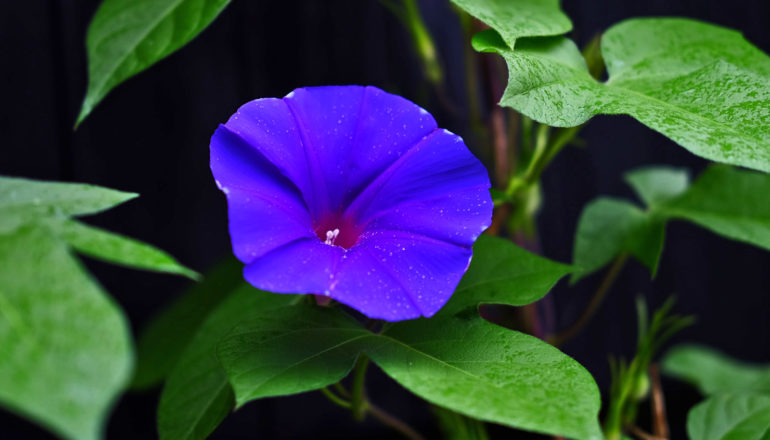
- Home
-
Home & Garden
- Food & Nutrition
Morning Glory Symbiosis May Yield New Psychedelic Drugs
- Barri Bronston-Tulane
- Read Time: 3 mins
nks to a symbiotic fungus, many species of morning glories contain elements of powerful psychedelic drugs called ergot alkaloids, according to new research.The seeds of the common tropical vine, whose namesake trumpet-like blooms only open in the morning, contain compounds that could be useful for treating mental and physical diseases as well as promoting well-being, says plant and fungal biologist Keith Clay, chair of the Tulane University department of ecology and evolutionary biology.
Researchers obtained samples of morning glory seeds from worldwide herbarium collections and screened them for ergot alkaloids, a compound associated with the hallucinogenic drug LSD, but which have also been used for treating migraine headaches and Parkinson’s disease.
Many morning glory species contain high concentrations of bioactive ergot alkaloids that are produced by specialized fungal symbionts passed down from mother plant to offspring through their seeds. Researchers found that one-quarter of over 200 species tested contained ergot alkaloids and were therefore symbiotic.
“The symbiosis and ergot alkaloids are specific to particular branches of the morning glory evolutionary tree, and each branch contains different ergot alkaloids and alkaloid mixtures,” Clay says.
Get The Latest By Email
Ergot alkaloids have had long and convoluted association with humans. Ergot alkaloids get their name from the ergot fungus responsible for deadly outbreaks of Saint Anthony’s Fire in the Middle Ages. The disease results from ingestion of the fungus. The best-known ergot alkaloid is LSD, a synthetic derivative of naturally occurring ergot alkaloids in morning glories produced by their fungal partners.
Indigenous peoples of Central and South America have historically used such alkyloid compounds for for their effects on the human mind and for regulating human reproduction. More recently they have been used for obstetric issues during labor and delivery and for treatment of migraine, Parkinson’s, and other maladies.
“We have known a lot about the fungal alkaloid chemistry and its effects on the mind and body for long time,” Clay says. “Our study is the first to show how highly coevolved morning glories and their symbiotic fungi are, and that coevolution is manifested by different mixtures and concentrations of ergot alkaloids across the morning glory evolutionary tree.”
Coauthors of the study in the journal Communications Biology are from Tulane, Indiana University, and the West Virginia University.
Source: Tulane University
About The Author
Barri Bronston-Tulanebooks_herbs
LATEST ARTICLES

Obesity Epidemic: Biology, Not Willpower, to Blame
Monday, 24 July 2023 19:42Today, mountains of calorie-rich (and often nutritionally poor) food and lakes of sugary beverages are readily available in much of the world. It’s no longer necessary to leave home — or even stand...

DIY Exercise Program: Stay Fit Without Breaking the Bank
Wednesday, 26 July 2023 12:55With the rising cost of living, gyms memberships and fitness classes are becoming increasingly unaffordable. But the good news is you can make just as much progress at home.

30 Minutes' Exercise Won't Counteract Sitting All Day... What Can?
Thursday, 20 May 2021 08:31It’s recommended we do at least 30 minutes of exercise a day – or 150 minutes a week – to stay healthy. But 30 minutes accounts for just 2% of the day. And many of us spend most of the rest of the...

5 Things That Can Interfere with Clear Interspecies Communication
Tuesday, 18 May 2021 16:15In my blog posts, free resources, and courses, I talk a lot about the things that we can do to support and develop our inborn, natural interspecies communication abilities. In this post, I...

Why I Love Wasps -- And Why You Should Too
Saturday, 08 May 2021 08:43Humanity has always had a rocky relationship with wasps. They are one of those insects that we love to hate. We value bees (which also sting) because they pollinate our crops and make honey

Baby Bees Love Carbs – Here's Why That Matters
Tuesday, 20 April 2021 08:05Wild bees are essential for sustaining the landscapes we love. A healthy community of wild pollinators ensures that most flowering plants have an A-team pollinator species and a reserve bench of...
New Attitudes - New Possibilities
InnerSelf.com | ClimateImpactNews.com | InnerPower.net
MightyNatural.com | WholisticPolitics.com | InnerSelf Market
Copyright ©1985 - 2021 InnerSelf Publications. All Rights Reserved. - Food & Nutrition

